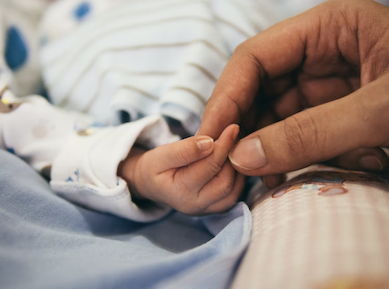Baby's 1st Year Milestones: A Guide for New Mothers
2022.02.17
A baby's first year of life is full of changes and new experiences. During pregnancy, you take time to prepare a room and buy a crib, clothes, and other necessary things before your baby arrives. Nevertheless, after the baby's birth, all this activity will be replaced with sleepless nights, feeding sessions, and diaper changes. A million questions will probably come to your mind. Is my baby normal? What is she feeling right now? How can I help her develop better and faster? The list goes on.

The truth is that as a new parent, you have no idea how these changes are going to affect you until they happen. In addition, all babies develop differently – what may be a major achievement for one child, could seem like an ordinary developmental stage for another one. However, there is a general list of milestones that most children achieve at the same time or within a few weeks from each other. This article will provide you with a general overview of these milestones and some tips that can come in handy as your baby learns to crawl, walk, talk and eat.
Rolling Over
This is one of the first milestones that most babies achieve. Around 4 months, you will notice that your baby can turn around and push himself or herself up using his or her arms and stomach muscles. For the next few days, she might even start rolling over from her back to her stomach and vice versa. This is normal as long as your baby does not lose this skill later on and if he or she does it gently without jerks or jerking movements. You can help your child by placing a rolled blanket under his or her hips to slightly elevate the pelvis as you lay him down for sleep – this encourages children to roll onto their tummies instead of their backs which usually occurs when they start going to sleep.
Sitting Up Unaided
This is another milestone most babies achieve between 4 and 6 months old. Most babies begin sitting up from lying down with the help of their own hands and feet. This is often a very exciting moment as babies love to look around them and discover the environment they are in. Your baby can now focus on objects above him at close range which is very helpful in learning about colors and shapes (e.g., holding toys at eye level). You can encourage your child by placing toys within his or her reach when she sits on the floor. You may also help by holding your baby's hands while he or she is sitting.
Crawling
Crawling is one of the milestones that your child will probably achieve by around 7 months. Most babies start pushing up onto their arms and knees before they learn to crawl. This is a good time for you as a parent to encourage your baby to learn to crawl and move around by placing toys and other objects in different spots around the house. When your baby starts crawling, you may want to place a soft blanket under him or her when he or she is on the floor so that he or she can practice moving forward while controlling his or her speed and direction. This will be very helpful during the walking time because babies need to learn how much pressure to put when they take each step.
Pulling Up To Stand And Walking
Most babies start pulling up from lying down between 8 and 10 months old. With the help of their own hands and feet, they straighten their body from a crawling position into a standing one for a few seconds before falling back again on all fours. This is a very exciting moment for parents as it comes with great anticipation and excitement. However, you need to be careful that your child does not stand or walk alone until one year old because he could fall over and hurt himself.
Words And Sounds
Your baby's vocabulary will probably start developing by 10 months. You can encourage this development by talking to him or her frequently – enunciating words so he or she understands what you are saying. Use the names of things around him such as his favorite toy so he learns how to identify them from others at an early age. When your baby starts babbling, it usually means that he or she is trying to form actual words and sounds using syllables that mimic the ones that adults make. The babbling sounds include ba, ma, da and was (and variations of these) which indicate your baby's inclination to mimic the sound patterns around him or her.
Teeth Growth
Most babies get their first tooth by 6 months old. However, this is not always helpful because some babies cut teeth very late while others do not cut any at all. If your baby does develop a tooth in time, you will notice that he or she drools often and chews on everything they can reach with their gums. Although it is important to make sure your child is teething properly without pain or discomfort, providing him or her with teething rings made of safe materials is usually the best way to help them feel comfortable during this stage when several teeth are coming through one after another.
Feeding Your Baby Solid Food
Introducing solid food is another milestone that most babies achieve between 4 and 6 months. You may notice your baby trying to grab food at the dinner table with his or her hands which is a sign of readiness for feeding himself or herself with finger foods. Some babies do not show the same signs, so you may want to wait until around 7 or 8 months before offering them solids. You can begin by introducing pureed fruit and vegetables alongside baby formula, as these are easy for your child to digest without upsetting his or her stomach. If you have a baby who is not showing any signs of readiness, you can talk to your doctor about the possibility of waiting a little longer so that your child gets all the nutrients he or she needs from breast milk or formula.

Baby's 1st year may seem like a long time at first, but it is truly filled with amazing milestones. You can help your baby achieve these by providing him or her with the right care and attention, exercise, and a healthy diet. This will not only make them grow up strong and healthy but it will also help you build a strong parent-and-child bond that will last for the rest of your life.
More Articles
Copyright © Fooyoh.com All rights reserved.